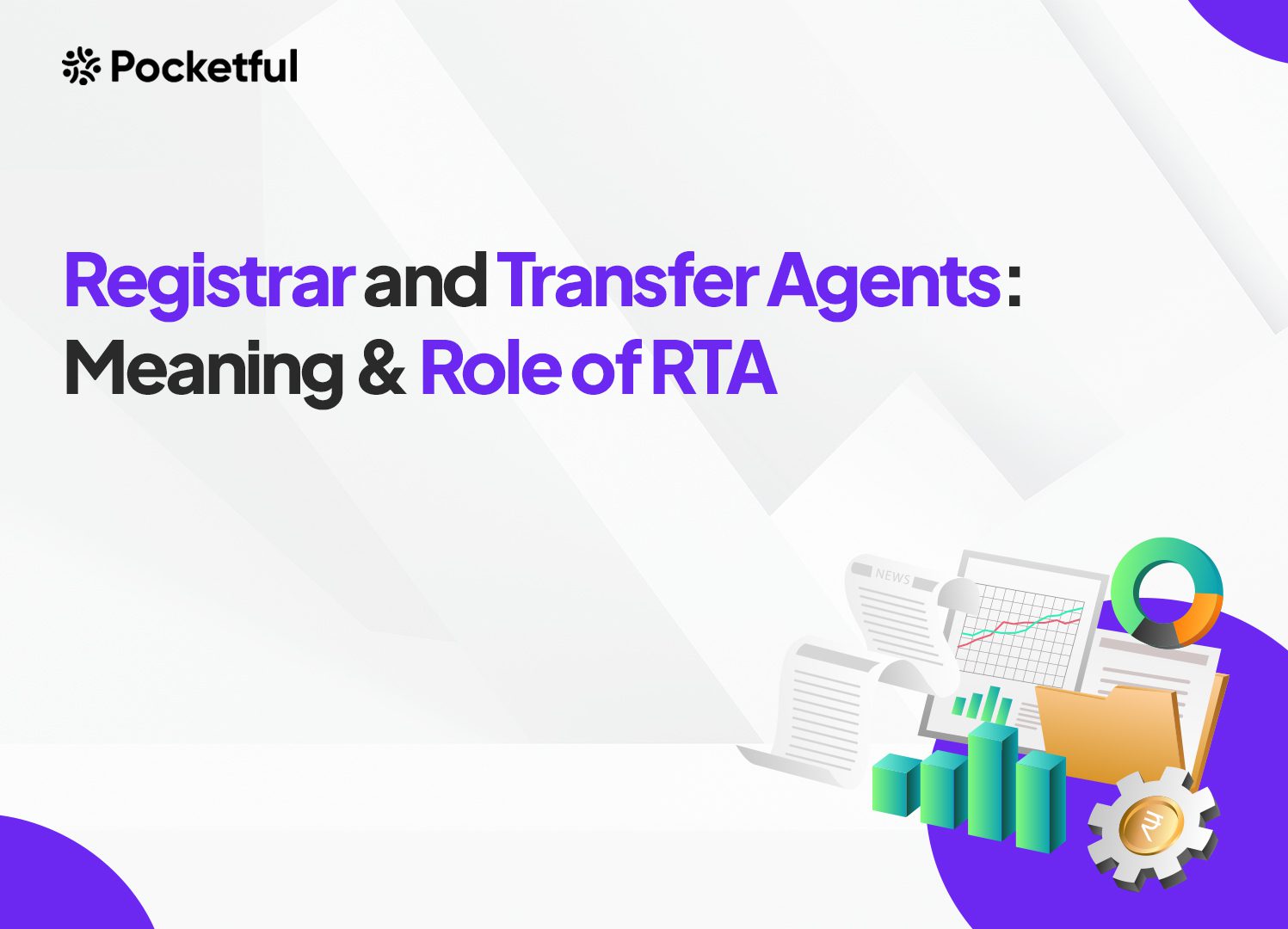| Type | Description | Contributor | Date |
|---|---|---|---|
| Post created | Pocketful Team | Sep-14-24 | |
| Add new links | Nisha | Mar-01-25 |

- Blog
- mutual funds
- registrar and transfer agents
Registrar And Transfer Agent: Definition, Roles, And Responsibilities

Are you a mutual fund investor? If yes, then have you ever wondered how asset management firms (AMCs) manage such a high volume of transactions daily, and how they plan to maintain an archive of all investors, including contact information? RTA, or Registrar and Transfer Agent, oversees the same, making the procedure a lot easier for AMCs.
In this blog, we will cover the meaning of Registrar and Transfer Agents (RTAs) in the mutual funds world and all the services they offer.
What is Registrar and Transfer Agent

Registrar and Transfer Agents, or RTAs, are financial entities that assist asset management companies (AMCs) in keeping track of ownership of mutual fund units. In simple terms, they help companies in record maintenance and typically serve as a middleman between investors and AMCs or securities issuers. RTAs offer services across the country via their digital platform and are registered with the market regulator, i.e. Securities and Exchange Board of India.
Roles and Responsibilities of RTA
There are various critical roles and responsibilities to be fulfilled by RTAs, a few of which are mentioned below:
- Maintenance of Records – RTAs are the sole entities responsible for maintaining records of investors or unit holders, including names, addresses, phone numbers, and other relevant information.
- Recording of Transactions – RTAs maintain a record of all securities transferred from one investor to another.
- Distribution of Dividend – After receiving payout details from asset management companies, RTAs ensure that the dividends are accurately distributed to the respective unit holders of a mutual fund.
- Regulatory Compliance – RTAs ensure full adherence to the regulations set by our regulator, i.e., the Securities and Exchange Board of India (SEBI).
Services Provided to Asset Management Companies
The following are different services provided by RTA to the AMCs:
- KYC Verification: One of the primary services is investor KYC verification to comply with SEBI regulations.
- Record Maintenance: RTAs keep up-to-date records of each investor’s contact details, including address and ownership information.
- Fund Accounting: RTAs assist AMCs with accurate NAV computation and ensure investors receive the correct investment value.
- Regulatory Compliance: Helping AMCs adhere to SEBI’s regulatory standards.
- Delivery of units: Ensuring the proper and timely delivery of mutual fund units to investors is one of the RTA’s most critical responsibilities.
Services Provided to Mutual Fund Investors
RTAs offer multiple services to the mutual fund investors. Such as:
- Transactions – RTAs facilitate mutual fund transactions via online platforms, enabling operations such as redemption, switching, and more.
- Statement of Accounts – Additionally, RTAs provide mutual funds investors with a consolidated account statement that presents a comprehensive snapshot of all the mutual fund holdings.
- Additional Requests – Through the online portal of RTAs, investors can submit various requests, such as cancellation of SIPs, STP, or SWP, updating bank account details, nomination changes, and much more.
- Dividend Distribution – RTAs manage the processing and delivery of dividends to the unitholders of mutual funds.
Services Provided to Alternative Investment Funds (AIFs)
RTAs provide services to alternative investment funds (AIFs) as well. Below mentioned are some of the key services:
- Client Onboarding: RTAs assist AIFs in onboarding new clients by verifying their eligibility which includes multiple compliance works such as KYC verification.
- Record Maintenance: They maintain comprehensive investor records for AIFs, including details on holdings, invested capital, dividends, capital gains, and more.
- Regulatory Compliance: RTAs help AIFs meet all SEBI-mandated requirements and prepare and submit necessary regulatory reports from time to time.
Did You Know?
As of 30 August 2024, there are 321 RTAs on Central Depository Services Limited (CDSL) and 97 RTAs on National Securities Depository Limited (NSDL). CDSL and NSDL are two government-registered depositories in India.
Read Also: Who Regulates Mutual Funds in India?
Charges by RTAs

The RTAs levy various charges on companies for providing their services. A few of these are mentioned below:
- Transaction-Based Charges – These charges are based on transactions done by the investors, such as purchases and redemptions.
- Asset-Based Charges – This fee is determined on the basis of assets under management (AUM) of the companies.
- Maintenance Fees – This is an annual fixed fee for keeping the records up to date of asset management companies.
- Dividend Fees – This charge is levied for processing and delivering the dividends to the unitholders of mutual funds.
- Compliance Fees – RTAs levy a compliance cost for providing services such as KYC verification, anti-money laundering documentation, and other compliance related tasks.
Remember that the investors bear all these costs, because eventually all fees or charges levied by the RTAs are often included in the total expense ratio (TER) of mutual funds.
Read Also: What is an Open-Ended Mutual Fund & How to Invest in it?
Conclusion
In summation, Registrars and Transfer Agents (RTAs) play a crucial role for asset management firms because they take all the responsibility of maintaining investor records, managing transaction data, facilitating new investor onboarding, compliance work, and much more.
Further, they also offer their services to Alternative Investment Funds (AIFs) and Portfolio Management Service (PMS) Companies.
| S.NO. | Check Out These Interesting Posts You Might Enjoy! |
|---|---|
| 1 | What Is An IPO Mutual Fund? Should You Invest? |
| 2 | Mutual Fund Taxation – How Mutual Funds Are Taxed? |
| 3 | What is Solution Oriented Mutual Funds? |
| 4 | What is TREPS & Why Mutual Funds Invest in it? |
| 5 | Debt Mutual Funds: Meaning, Types and Features |
Frequently Asked Questions (FAQs)
Can I directly contact the RTA for my investment-related issues?
Yes, if an investor has any questions related to their investment in mutual funds, they can speak with the relevant RTA directly.
How can I check which mutual funds are managed by which RTA?
You can easily know the RTA of your mutual fund by checking the account statements sent by the AMCs. Alternatively, visit the AMC website and navigate to the Investor or Contact Us section to find the RTA details.
What should I do if RTA does not resolve my complaint?
One can directly complain to RTA via their customer service. In case no satisfactory resolution is provided, one can file a complaint with SEBI via their SCORES online platform.
What is the function of the Registrar and Transfer Agent in the mutual fund industry?
RTAs keep a track of transaction records and investors information. In simple terms, they provide record maintenance services to the AMCs. Apart from this, they also ensure that investors receive appropriate units for their investments.
Who is the regulating authority for the Registrar and Transfer Agents (RTAs)?
The Securities and Exchange Board of India oversees the Registrar and Transfer Agents.
Disclaimer
The securities, funds, and strategies discussed in this blog are provided for informational purposes only. They do not represent endorsements or recommendations. Investors should conduct their own research and seek professional advice before making any investment decisions.